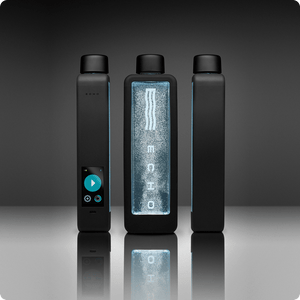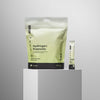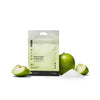Freezing hydrogen water at home creates… regular ice. When you freeze hydrogen-rich water, the molecular hydrogen (H₂) that gives the water its benefits can escape. So while the water still freezes, the hydrogen often doesn't stick around.
Here’s what that means for your health, your hydration routine, and your Echo Flask.
Why Doesn't Hydrogen Freeze in Water?
You already know the benefits of hydrogen water, but wouldn't it be nice to be able to pre-freeze ice cubes for later use? Unfortunately, it's not that simple.
Hydrogen water is purified water that’s been infused with molecular hydrogen gas (H₂). That’s it—just water and a little extra hydrogen.
Why add hydrogen? Because preliminary studies suggest that it acts as a selective antioxidant. Hydrogen’s small size allows it to travel quickly into cells—and out of water. You have about 15 minutes to drink freshly-generated hydrogen water to get its full effect.
You’ll sometimes hear it called hydrogenated water, hydrogen enriched water, or hydrogen rich water. All these terms refer to liquid water containing dissolved hydrogen gas.
What Happens When Water Freezes?
You can see what freezing might do to hydrogen water.
At 0°C (32°F), water molecules begin forming ice crystals, locking into a structured pattern. This slows down molecular movement, turning the water into a solid.
This happens to tap water, purified water, distilled water, or any other kind of liquid water. But here’s the key: as ice forms, gases trapped in the water—like oxygen, carbon dioxide, and hydrogen—can be forced out.
This is where things get tricky for molecular hydrogen.
Can You Freeze Hydrogen Water Without Losing Hydrogen?
Hydrogen is the lightest, smallest, and most volatile element in the universe. Because of that, it doesn’t like to stay put—especially under pressure or changing temperatures.
When you freeze hydrogen water:
-
Ice crystals form
-
Gas solubility changes
-
Hydrogen gas escapes
Even if the water is sealed in a hydrogen water bottle, freezing may still reduce the hydrogen concentration.
That’s because the hydrogen gas doesn’t bind to the water molecules—it’s simply dissolved in the water. And once the temperature drops, that dissolved hydrogen wants to escape.
What About Supercooled Water?
If you have an industrial supercooler or a cryostat in your living room, you might be able to pull this off.
Supercooled water stays in liquid form even below the freezing point. In lab settings, this can help preserve dissolved gases like hydrogen, but in real-world situations (like your freezer), it’s not reliable or safe.
Most people don’t have equipment to properly supercool water. If you’re freezing hydrogen water at home, it’s going to turn into ice—and that’s where hydrogen loss happens.
Will Your Hydrogen Water Bottle Be Damaged?
Another concern: freezing can damage your hydrogen water bottle—especially if it’s electric like the Echo Flask.
These bottles are designed for hydrogen production, not to withstand the expansion that happens when water freezes. As water turns to ice, it expands, which can crack the container or damage the electrodes.
If you're using a high-tech water ionizer, hydrogen tablet, or Echo Flask, freezing isn't recommended.
Better Ways to Keep Hydrogen Water Cold
If you like cold water, here’s a better strategy:
-
Start with chilled water
-
Use a double-walled insulated bottle
-
Generate fresh hydrogen water using the Echo Flask
-
Drink it within 10–30 minutes for maximum hydrogen retention
You can also store hydrogen water in the fridge for a few minutes, but avoid long storage—even cold. The hydrogen molecules will gradually escape over time, even in bottled water.
FAQs: Freezing Hydrogen Water
Q: Will I still get the same hydrogen water benefits after freezing?
A: No. Freezing likely reduces the hydrogen content, which reduces potential benefits.
Q: Is frozen hydrogen water dangerous?
A: No. It’s just plain water with less hydrogen.
Q: Can I freeze alkaline or ionized water?
A: You can, but again, any dissolved hydrogen likely won't survive the freeze.
Q: Does freezing improve storage?
A: Not for hydrogen water. It’s best consumed fresh within minutes to a few hours.







